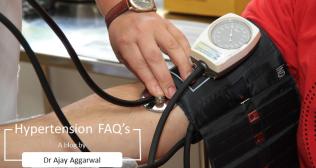
Diabetes! Don?T Worry, Stay Fit
 For effective management of diabetes and prevention of any complications, educating patients and their family members on diabetes management and lifestyle modification is of paramount importance
For effective management of diabetes and prevention of any complications, educating patients and their family members on diabetes management and lifestyle modification is of paramount importance
Diabetes diagnosis can be overwhelming, but fret not, you are not alone. The key to conquering this menace is by keeping your blood sugar levels controlled with the help of your doctor. Exercising more regularly, reducing excess weight, eating a healthy balanced diet, taking medications as prescribed and adopting a healthy lifestyle can significantly reduce the chances of developing complications.
Diabetes, also called as diabetes mellitus, is a group of diseases in which there are high levels of sugar in the blood over an extended period of time. Diabetes is a metabolic disease in which pancreas in the human body fails to produce insulin or is unable to use the insulin produced in an effective manner.
A person suffering from diabetes shows symptoms such as frequent urination, blurred vision, fatigue, excessive thirst, weight loss and increased appetite. High blood sugar levels can cause serious complications including heart disease, damage to blood vessels, stroke, dental problems, kidney failure, foot ulcers, recurrent infections, nerve damage, eye damage and coma.You should consult with one of the best doctors for diabetes if you face such symptoms.If sugar levels are kept under control, a person suffering from diabetes can possibly live a life free of complications.
Diabetes Complications
Heart disease and blood vessel disease are the biggest complications of uncontrolled diabetes. Diabetic patients have two to four times higher risk of suffering from fatal heart diseases and strokes than non-diabetics.
Diabetes can cause peripheral artery disease i.e. poor blood flow in the legs and feet. It can also damage blood vessels or nerves causing foot problems that can lead to amputations. Controlling diabetes can prevent or stop the progression of this disease.
Kidney Disease: Diabetes is the main cause of kidney failure in adults. Drugs that lower blood pressure can lower risk of kidney failure remarkably.
Vision problems: Diabetes can cause a number of eye problems, some of which can lead to blindness if not addressed. Eye disorders such as glaucoma, cataract or diabetic retinopathy are all complications of diabetes. Regular eye check-up and timely treatment could prevent up to 90 per cent of diabetes-related eye problems and blindness.
Diabetes and Nerves: Approximately 60-70 per cent of people with diabetes have some form of nerve damage. High blood sugar levels can harm the nerves leading to loss of sensation, pain or burning feeling in feet.
Dental problems: People with diabetes are at a higher risk for dental problems such as gums disease. Visiting your dentist regularly and taking good care of your teeth along with keeping diabetes under control can prevent gum disease and tooth loss.
Prevention of Progression of Diabetes
To prevent progression of diabetes, medications should start as soon as you get complication symptoms. Minor lifestyle changes may be required, e.g. if you have early diabetic nephropathy, you can take early treatment before the complication advances. Keeping your blood sugar levels under control can help slow the progression of your condition and may prevent other complications.
Treatment
Treatment for diabetes may vary from patient to patient, based on their individual symptoms and other factors. According to the best doctors for diabetes,there are several treatment options that could be recommended by a doctor, keeping in mind a patient’s health and the severity of the problem. However, it is absolutely essential for all the patients to follow the diabetes treatment guidelines set by their doctor completely.
Diabetes treatment may include:
- Medications
- Insulin injections
- Weight reduction strategies
- Constant monitoring of blood sugar levels
- Bariatric (weight loss) surgery
- Regular medical check-up
- Regular consultations with diabetes educators and nutritionists
It is important to realize that the main diabetes treatment goal is to control blood sugar levels, so as to lead a normal life.


















